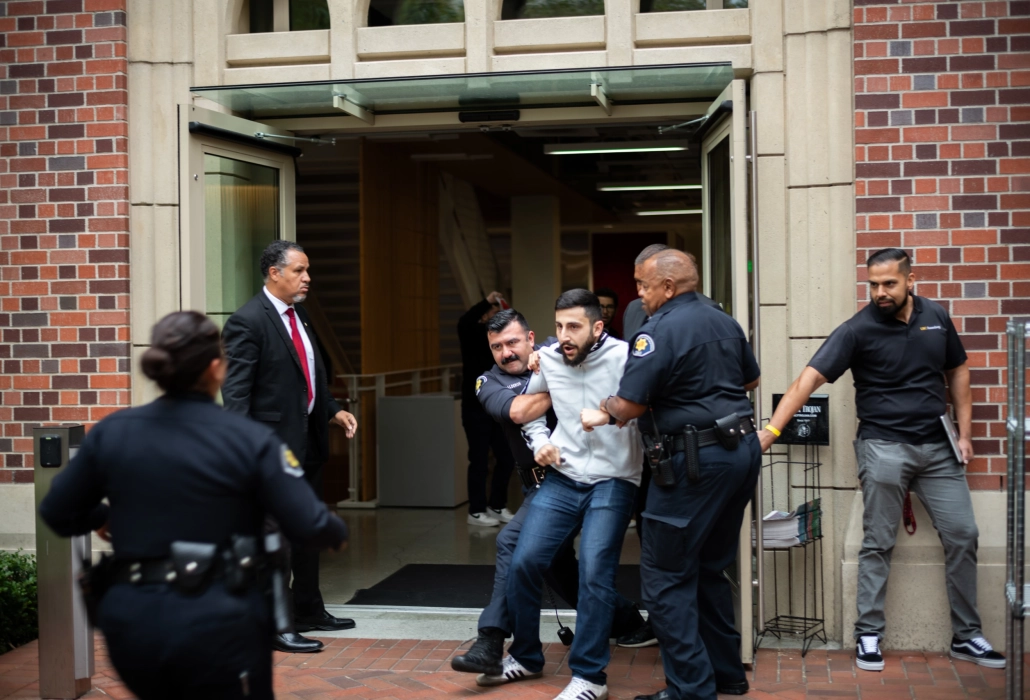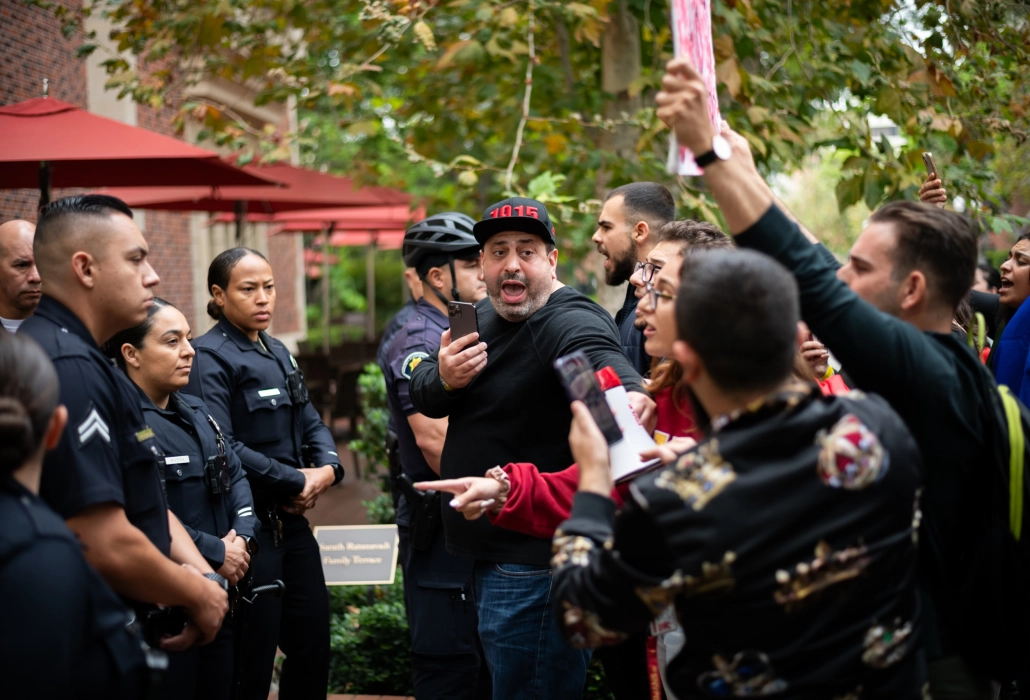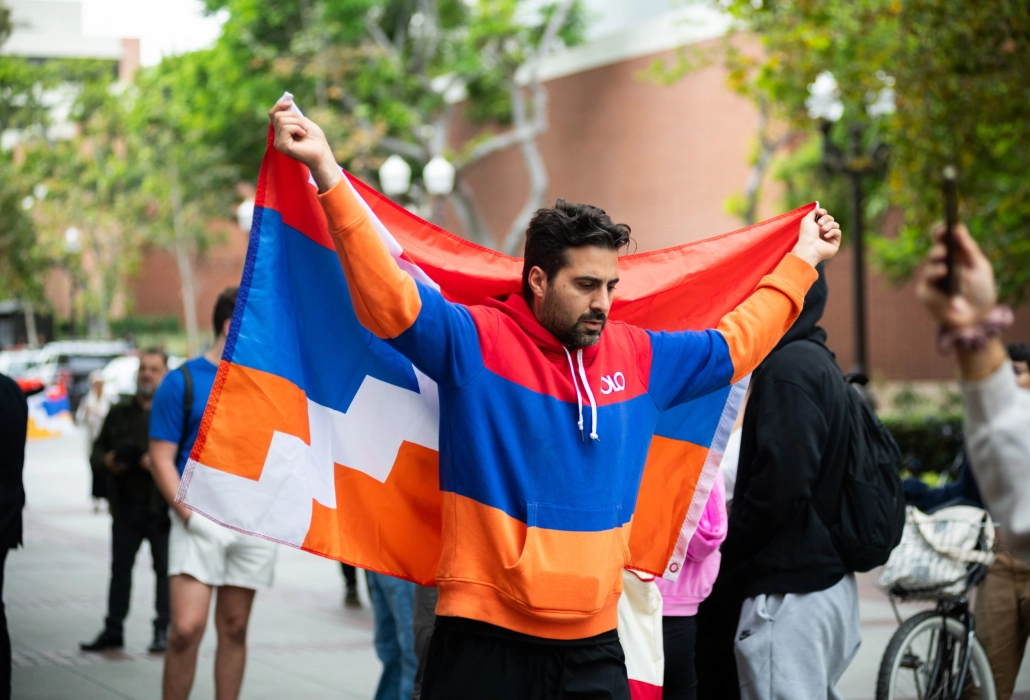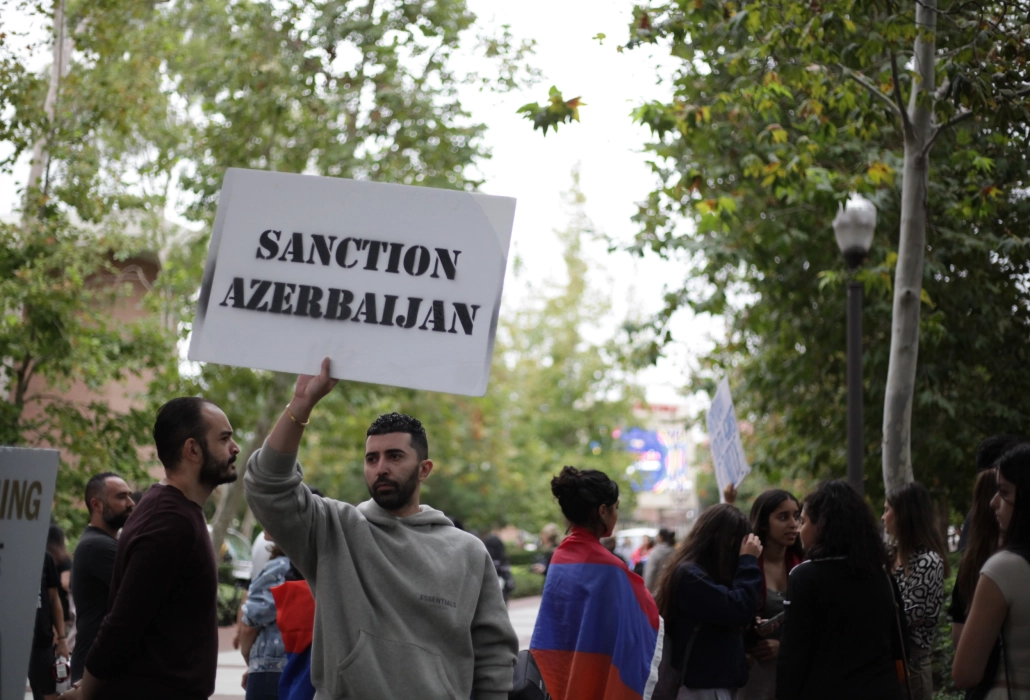Armenian students and supporters protest Annenberg event featuring Turkish ambassador
Demonstrators gathered to call out the University for hosting Hasan Murat Mercan, who they believe is complicit in an ongoing genocide of Armenians.
Demonstrators gathered to call out the University for hosting Hasan Murat Mercan, who they believe is complicit in an ongoing genocide of Armenians.





Chanting “shame on USC” and “shame on Turkey,” about 50 protestors demonstrated at Annenberg Hall Friday morning against the Annenberg School of Communication and Journalism’s Master of Public Diplomacy program’s reception of Hasan Murat Mercan, ambassador of Turkey to the United States and the Azerbaijani special counsel.
The event drew out Department of Public Safety and Los Angeles Police Department officers, who forcibly removed protestors out of Sheindlin Forum. Outside, demonstrators held signs that read “LOS ANGELES DO YOUR PART!” and “1915 NEVER AGAIN” — referencing the genocide of 600,000 to 1.5 million Armenians in Turkey from 1915 to 1916.
Protesters expressed frustration at the Turkish government’s historic genocide denial. They also condemned the event’s timing as early Thursday morning, the Republic of Artsakh, an Armenian ancestral homeland and self-declared state in internationally-recognized Nagorno-Karabakh and Azerbaijan, announced that it would formally dissolve itself by January 2024.
On Sept. 19, Azerbaijan’s “anti-terrorist” offensive in Nagorno-Karabakh resulted in more than 200 casualties. Nearly 80,000 Armenians living in the region have already left, seeking refuge in Armenia proper or relocating to southern Russia, where they fear further displacement.
Katherine Aghayan, a senior majoring in political science, said she attended Friday’s protest and event because she felt obligated to speak on behalf of her people. While she also frequently attends University panels, Aghayan said hosting a “genocide denier” struck a chord with her.
“Our ancestors died for this,” she said. “Not only that, but it’s happening right now in the region … Our families, many of these students’ families right now in Artsakh are being affected.”
The first disruption occurred before the event started.
“One hundred twenty thousand people dead or homeless because of you,” an Armenian-flag-clad protester shouted from the audience in the hall.
Security expelled the man from the building as he shouted at Mercan and the Azerbaijani consulate. Amid a stunned room, the moderator — Robert Banks, director of the Masters of Public Diplomacy program — introduced Mercan.
Moments later in the Sheindlin Forum, Mane Berikyan, vice president of USC’s Armenian Students’ Association, stood up with several students and chanted, “genocidal policy has no place in diplomacy.”
It took DPS officers about 15 minutes to evict the students, who joined a crowd assembled outside. Mercan gave a quick laugh afterward, telling the audience that he was accustomed to college students’ “hot blood.”
Throughout the event, loudspeaker sirens and chanting could be heard through the conference room walls. An attending student asked the ambassador to address the protesters.
“Now, personally, if we stuck with the history, everyone has [their] own narrative,” Mercan said. “I have my own narrative. Armenia has its own narrative. On this issue of so-called genocide, our position has been very clear … Tragedies took place, Armenians and Turks alike [were] killed.”
Zare Arakelyan, political chair of USC ASA, said that he disagreed with Mercan’s notion of multiple narratives.
“This isn’t a two-sided conflict,” said Arakelyan, a sophomore majoring in applied and computational mathematics. “The evidence is all out there of ethnic cleansing … Azerbaijan right now is trying to push forward the narrative that since they’ve done all of this within their so-called internationally recognized borders, that this is an internal affair.”
Outside, protesters — many draped in Armenian flags — crowded a side entrance, confronting officers guarding the building. At a different entrance, demonstrators distributed flyers and swarmed when officers forcibly carried out a protester. A group marched with a banner that read, “GENOCIDE DENIED, GENOCIDE REPEATED.”
Around 10:30 a.m., Annenberg Hall closed to the public. Class-bound students required an official escort for entry.
Protestors demonstrated nonviolently for the most part, barring a brief moment where some banged on Annenberg’s doors. DPS officers physically engaged with some, shoving protestors away from the building’s doors. One officer pushed a protester into a table set up for bag checks.
When the event ended, the protesting crowd stayed outside the building. Behind Tutor Campus Center, a group linked arms in a line hoping to block the ambassador’s car.
Waiting there for hours, demonstrators gave speeches and chanted. They dissipated around 3:30 p.m., believing the ambassador had left.
Eric Abnoosian, a senior studying pharmacology and drug development and translational biotechnology, said he was appalled that USC would allow a member of the Turkish government to speak at a university with genocide education programs.
“We have the USC Shoah Foundation that does work on research, that does work on genocide education,” he said. “This is a school of journalism, and the fact that we have these two institutions and they still let a genocide denier come talk to us is ridiculous, and it’s just so insensitive to the Armenian community.”
In a post-event statement to the Daily Trojan, Annenberg recognized students’ and communities’ right to free speech.
“We recognize and understand that the USC Armenian Students’ Association and members of the Armenian community had objections to the event,” the emailed statement read. “The university believes that the freedom to express one’s views are at the foundation of what it means to be part of a research university.”
During the event, Arakelyan asked Banks how he could claim to have an open discourse with members of the community despite the moderated conference’s one-sided nature.
“This is not an open discussion,” Banks said.
We are the only independent newspaper here at USC, run at every level by students. That means we aren’t tied down by any other interests but those of readers like you: the students, faculty, staff and South Central residents that together make up the USC community.
Independence is a double-edged sword: We have a unique lens into the University’s actions and policies, and can hold powerful figures accountable when others cannot. But that also means our budget is severely limited. We’re already spread thin as we compensate the writers, photographers, artists, designers and editors whose incredible work you see in our daily paper; as we work to revamp and expand our digital presence, we now have additional staff making podcasts, videos, webpages, our first ever magazine and social media content, who are at risk of being unable to receive the compensation they deserve.
We are therefore indebted to readers like you, who, by supporting us, help keep our paper daily (we are the only remaining college paper on the West Coast that prints every single weekday), independent, free and widely accessible.
Please consider supporting us. Even $1 goes a long way in supporting our work; if you are able, you can also support us with monthly, or even annual, donations. Thank you.
This site uses cookies. By continuing to browse the site, you are agreeing to our use of cookies.
Accept settingsDo Not AcceptWe may request cookies to be set on your device. We use cookies to let us know when you visit our websites, how you interact with us, to enrich your user experience, and to customize your relationship with our website.
Click on the different category headings to find out more. You can also change some of your preferences. Note that blocking some types of cookies may impact your experience on our websites and the services we are able to offer.
These cookies are strictly necessary to provide you with services available through our website and to use some of its features.
Because these cookies are strictly necessary to deliver the website, refusing them will have impact how our site functions. You always can block or delete cookies by changing your browser settings and force blocking all cookies on this website. But this will always prompt you to accept/refuse cookies when revisiting our site.
We fully respect if you want to refuse cookies but to avoid asking you again and again kindly allow us to store a cookie for that. You are free to opt out any time or opt in for other cookies to get a better experience. If you refuse cookies we will remove all set cookies in our domain.
We provide you with a list of stored cookies on your computer in our domain so you can check what we stored. Due to security reasons we are not able to show or modify cookies from other domains. You can check these in your browser security settings.
These cookies collect information that is used either in aggregate form to help us understand how our website is being used or how effective our marketing campaigns are, or to help us customize our website and application for you in order to enhance your experience.
If you do not want that we track your visit to our site you can disable tracking in your browser here:
We also use different external services like Google Webfonts, Google Maps, and external Video providers. Since these providers may collect personal data like your IP address we allow you to block them here. Please be aware that this might heavily reduce the functionality and appearance of our site. Changes will take effect once you reload the page.
Google Webfont Settings:
Google Map Settings:
Google reCaptcha Settings:
Vimeo and Youtube video embeds:
The following cookies are also needed - You can choose if you want to allow them:
